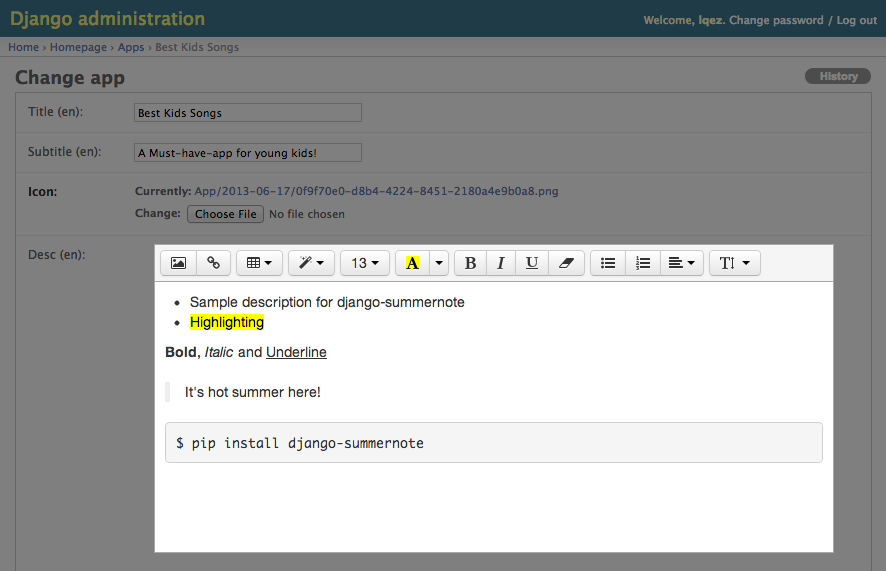Summernote is a simple WYSIWYG editor.
django-summernote allows you to embed Summernote into Django very handy. Support admin mixins and widgets.
-
Install
django-summernoteto your python environment.pip install django-summernote -
Add
django_summernotetoINSTALLED_APPSinsettings.py.INSTALLED_APPS += ('django_summernote', ) -
Add
django_summernote.urlstourls.py.-
For Django 1.x
urlpatterns = [ ... url(r'^summernote/', include('django_summernote.urls')), ... ] -
For Django 2.x
from django.urls import include # ... urlpatterns = [ ... path('summernote/', include('django_summernote.urls')), ... ]
-
-
Be sure to set proper
MEDIA_URLfor attachments.-
The following is an example test code:
MEDIA_URL = '/media/' MEDIA_ROOT = os.path.join(BASE_DIR, 'media/') -
When debug option is enabled(
DEBUG=True), DO NOT forget to add urlpatterns as shown below:from django.conf import settings from django.conf.urls.static import static if settings.DEBUG: urlpatterns += static(settings.MEDIA_URL, document_root=settings.MEDIA_ROOT) -
Please, read the official v3.0 documentation for more details on file uploads.
-
-
If you're using Django 3.x with default SummernoteWidget, then
- Do not forget to set
X_FRAME_OPTIONS = 'SAMEORIGIN'in your django settings. - Clickjacking Protection
- Do not forget to set
-
Run database migration for preparing attachment model.
python manage.py migrate
In admin.py,
from django_summernote.admin import SummernoteModelAdmin
from .models import SomeModel
# Apply summernote to all TextField in model.
class SomeModelAdmin(SummernoteModelAdmin): # instead of ModelAdmin
summernote_fields = '__all__'
admin.site.register(SomeModel, SomeModelAdmin)Although Post model has several TextField, only content field will have SummernoteWidget.
In admin.py,
from django_summernote.admin import SummernoteModelAdmin
from .models import Post
class PostAdmin(SummernoteModelAdmin):
summernote_fields = ('content',)
admin.site.register(Post, PostAdmin)In forms,
from django_summernote.widgets import SummernoteWidget, SummernoteInplaceWidget
# Apply summernote to specific fields.
class SomeForm(forms.Form):
foo = forms.CharField(widget=SummernoteWidget()) # instead of forms.Textarea
# If you don't like <iframe>, then use inplace widget
# Or if you're using django-crispy-forms, please use this.
class AnotherForm(forms.Form):
bar = forms.CharField(widget=SummernoteInplaceWidget())And for ModelForm,
class FormFromSomeModel(forms.ModelForm):
class Meta:
model = SomeModel
widgets = {
'foo': SummernoteWidget(),
'bar': SummernoteInplaceWidget(),
}Last, please don't forget to use safe templatetag while displaying in templates.
{{ foobar|safe }}
Warning: Please mind, that the widget does not provide any escaping. If you expose the widget to external users without taking care of this, it could potentially lead to an injection vulnerability. Therefore you can use the SummernoteTextFormField or SummernoteTextField, which escape all harmful tags through mozilla's package bleach:
In forms,
from django_summernote.fields import SummernoteTextFormField, SummernoteTextField
class SomeForm(forms.Form):
foo = SummernoteTextFormField()And for ModelForm,
class FormForSomeModel(forms.ModelForm):
foo = SummernoteFormField()django-summernote is served with Bootstrap3 by default, but you can choose other options.
You can change the theme by setting SUMMERNOTE_THEME = '<theme_name>' in settings.py.
SUMMERNOTE_THEME accepts the following values:
bs3: Bootstrap3 themebs4: Bootstrap4 themelite: Lite UI theme (without Bootstrap)
In settings.py
SUMMERNOTE_THEME = 'bs4' # Show summernote with Bootstrap4Support customization via settings.
Put SUMMERNOTE_CONFIG into your settings file.
In settings.py,
SUMMERNOTE_CONFIG = {
# Using SummernoteWidget - iframe mode, default
'iframe': True,
# Or, you can set it to `False` to use SummernoteInplaceWidget by default - no iframe mode
# In this case, you have to load Bootstrap/jQuery sources and dependencies manually.
# Use this when you're already using Bootstrap/jQuery based themes.
'iframe': False,
# You can put custom Summernote settings
'summernote': {
# As an example, using Summernote Air-mode
'airMode': False,
# Change editor size
'width': '100%',
'height': '480',
# Use proper language setting automatically (default)
'lang': None,
# Toolbar customization
# https://summernote.org/deep-dive/#custom-toolbar-popover
'toolbar': [
['style', ['style']],
['font', ['bold', 'underline', 'clear']],
['fontname', ['fontname']],
['color', ['color']],
['para', ['ul', 'ol', 'paragraph']],
['table', ['table']],
['insert', ['link', 'picture', 'video']],
['view', ['fullscreen', 'codeview', 'help']],
],
# Or, explicitly set language/locale for editor
'lang': 'ko-KR',
...
# You can also add custom settings for external plugins
'print': {
'stylesheetUrl': '/some_static_folder/printable.css',
},
'codemirror': {
'mode': 'htmlmixed',
'lineNumbers': 'true',
# You have to include theme file in 'css' or 'css_for_inplace' before using it.
'theme': 'monokai',
},
},
# Require users to be authenticated for uploading attachments.
'attachment_require_authentication': True,
# Set `upload_to` function for attachments.
'attachment_upload_to': my_custom_upload_to_func(),
# Set custom storage class for attachments.
'attachment_storage_class': 'my.custom.storage.class.name',
# Set custom model for attachments (default: 'django_summernote.Attachment')
'attachment_model': 'my.custom.attachment.model', # must inherit 'django_summernote.AbstractAttachment'
# You can completely disable the attachment feature.
'disable_attachment': False,
# Set to `True` to return attachment paths in absolute URIs.
'attachment_absolute_uri': False,
# test_func in summernote upload view. (Allow upload images only when user passes the test)
# https://docs.djangoproject.com/en/2.2/topics/auth/default/#django.contrib.auth.mixins.UserPassesTestMixin
```
def example_test_func(request):
return request.user.groups.filter(name='group_name').exists()
```
'test_func_upload_view': example_test_func,
# You can add custom css/js for SummernoteWidget.
'css': (
),
'js': (
),
# You can also add custom css/js for SummernoteInplaceWidget.
# !!! Be sure to put {{ form.media }} in template before initiate summernote.
'css_for_inplace': (
),
'js_for_inplace': (
),
# Codemirror as codeview
# If any codemirror settings are defined, it will include codemirror files automatically.
'css': (
'//cdnjs.cloudflare.com/ajax/libs/codemirror/5.29.0/theme/monokai.min.css',
),
# Lazy initialization
# If you want to initialize summernote at the bottom of page, set this as True
# and call `initSummernote()` on your page.
'lazy': True,
# To use external plugins,
# Include them within `css` and `js`.
'js': {
'/some_static_folder/summernote-ext-print.js',
'//somewhere_in_internet/summernote-plugin-name.js',
},
}- There are pre-defined css/js files for widgets.
- See them at summernote default settings
- About language/locale: Summernote i18n section
- About Air-mode, see Summernote air-mode example page.
- About toolbar customization, please refer Summernote toolbar section.
You can style the editor via widget's attributes. These adhoc styling will override settings from SUMMERNOTE_CONFIG.
# Apply adhoc style via attributes
class SomeForm(forms.Form):
foo = forms.CharField(widget=SummernoteWidget(attrs={'summernote': {'width': '50%', 'height': '400px'}}))You can also pass additional parameters to custom Attachment model by adding attributes to SummernoteWidget or SummernoteInplaceWidget, any attribute starting with data- will be pass to the save(...) method of custom Attachment model as **kwargs.
# Pass additional parameters to Attachment via attributes
class SomeForm(forms.Form):
foo = forms.CharField(widget=SummernoteWidget(attrs={'data-user-id': 123456, 'data-device': 'iphone'}))Run tox. If you don't have it, just pip install tox
You can also run test with only specified targets.
$ tox -e py27-dj111, py38-dj301
django-summernote does currently not support upload of non-image files.
django-summernote is distributed under MIT license and proudly served by great contributors.

